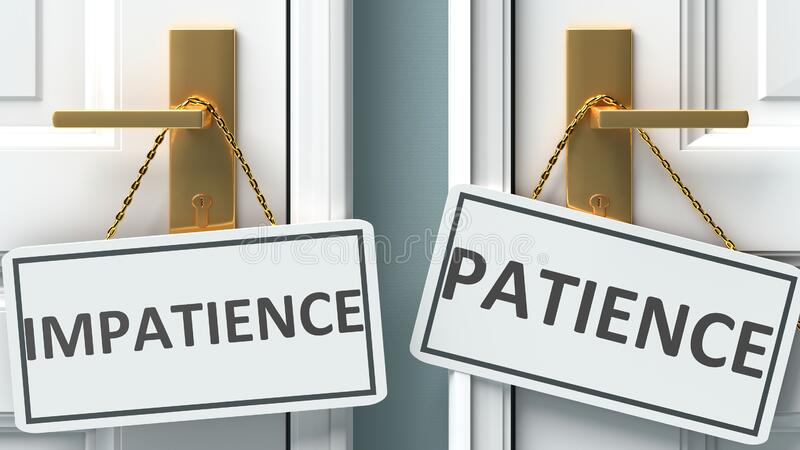We all know what it feels like to be impatient. We’ve all been there – waiting in line at the grocery store, stuck in traffic, or waiting for a friend to show up. Impatience is that feeling of restlessness and anxiety that comes when we’re not getting what we want as quickly as we want it. In this blog post, we’ll explore what impatience is, why it happens, and how to deal with it.
Most of us have a pretty good understanding of what impatience is. We know it’s that feeling of frustration and annoyance that comes when we’re not getting what we want fast enough. But did you know that there’s actually a scientific definition for impatience?
According to psychologists, impatience is “a personality trait characterized by a low tolerance for frustration and a strong desire for immediate gratification.” In other words, impatient people are more likely to get upset when things don’t go their way, and they’re always looking for the quickest and easiest solution.
Contents
- 1 Do you really know what is impatience?
- 2 Impatience is your hormones
- 3 Impatience Laws
- 4 Impatience is a visible enemy
- 5 Anxiety and over-thinking are causes of worry, and techniques to deal with them
- 6 Impatience can cost us, save yourself
- 7 Causes and types of Impatience
- 8 Types of Impatience
- 9 Degrees/Stages of impatience
- 10 Signs of Impatience
- 11 Support groups
- 12 Conclusion
- 13 A Word From Therapy Mantra
Do you really know what is impatience?

Impatience is more than just a feeling of frustration. It’s actually a personality trait that makes people more likely to get upset when things don’t go their way. Impatient people are always looking for the quickest and easiest solution, which can often lead to problems down the road. Impatience is a long road to remorse and regret because it impairs your ability to think clearly.
Impatience is the visible which knows yours from the core, and attacks where it hurts the most. It is the loudest noise in a silent room, and can completely take over your life if you let it.
Impatience is your hormones

When you’re impatient, it’s not just your emotions that are out of control. Your hormones are also to blame. According to one study, the hormone cortisol is linked to impatience. When levels of cortisol are high, people are more likely to give up on tasks that take longer than they expect. Cortisol is often referred to as the “stress hormone” because it’s released in response to stressful situations.
So, if you’re feeling impatient, it could be because your cortisol levels are too high. Luckily, there are a few things you can do to lower your cortisol levels and get rid of that feeling of impatience. Exercise is one great way to reduce stress and lower cortisol levels. Meditation and deep breathing are also effective stress-busters. Hormonal imbalance causes you to lose patience.
Impatience Laws

There are actually a few laws that deal with impatience. For example, the law of diminishing returns states that the more time you spend on a task, the less productive you become. This is because our brains can only focus for so long before we start to get tired and make mistakes.
- The Pareto principle is another law that’s relevant to impatience. This principle states that 80% of the results come from 20% of the effort. In other words, you don’t need to work yourself to the bone to get results. Sometimes, it’s better to focus your energy on a few key tasks rather than trying to do everything at once.
- If you’re feeling overwhelmed and impatient, it might help to remember these laws. They’ll remind you that taking a break is sometimes more productive than working non-stop and that you don’t need to do everything perfectly to get results.
- Impatience is a visible enemy, showing results which regretful later.
- Moreover, while impatience may seem like an invisible force, it actually has some very real and noticeable effects. For example, impatient people are more likely to make impulsive decisions. This can lead to problems like overspending, risky behavior, risking your and your loved ones life and relationship conflict.
- Impatience can also lead to physical health problems. Studies have linked impatience to high blood pressure, heart disease, and even premature death. So if you’re struggling with impatience, it’s important to find ways to cope with it. Otherwise, you could be putting your health at risk, and its effects can be devastating.
Impatience is a visible enemy

If you’re struggling with impatience, don’t wait to get help. Talk to your doctor or a mental health professional about ways to manage your symptoms. There are also many helpful books and articles on the subject. The sooner you start dealing with your impatience, the better.
One of the best ways to deal with impatience is to understand what it is and why you’re feeling it. Once you know the root cause of your frustration, you can start to find ways to cope with it. Use this guide as a starting point, and remember that there’s no shame in seeking help if you need it. With
Anxiety and over-thinking are causes of worry, and techniques to deal with them

Anxiety and over-thinking are two of the main causes of impatience. If you’re constantly worrying about things that might go wrong, it’s only natural that you’ll start to feel impatient. After all, your brain is trying to protect you from potential danger by making you anxious.
Fortunately, there are a few things you can do to calm your anxious mind. Meditation and mindfulness are two great techniques for reducing anxiety. Exercise is also a good way to relieve stress and anxiety.
If you’re struggling with overthinking, it might help to talk to a therapist or counselor. They can teach you how to challenge your negative thoughts, transform them into positive ones and worry less about things that are out of your control.
Impatience can cost us, save yourself
While impatience may seem like a minor annoyance, it can actually have some serious consequences. It can cost us our relationships, our health, and even our lives.
Remember, there’s no shame in seeking help if you need it. With patience and understanding, you can overcome impatience and live a happier, healthier life.
Causes and types of Impatience
There are many different types of impatience. Some people are impatient because they’re either anxious or an overthinker. Others become impatient when they’re tired or hungry. And still, others might be impatient due to a medical condition like ADHD.
No matter what the cause, there are ways to manage and cope with impatience. With patience and understanding, you can overcome impatience and live a happier, healthier life.
Types of Impatience
- Anxiety
- Overthinking
- Tiredness
- Hunger
- ADHD
Degrees/Stages of impatience
Mild impatience- You may become slightly irritable or frustrated when things don’t go as planned. Don’t allow mild impatience take advantage of you.
Moderate impatience- You may have trouble concentrating or completing tasks. You may also start to feel physically tense and have a hard time relaxing.
Severe impatience- You may experience panic attacks, anxiety, or rage. You may also start to experience physical symptoms like chest pain or headaches.
Shouting- You may find yourself yelling or losing your temper more easily.
Clamor- You don’t want to reach this stage. This is when your impatience leads to self-harm or harm to others.
Psychological Impatience- When you’re impatient, you may also become depressed or anxious. You might start to have negative thoughts about yourself or your life.
Situational Impatience- This is when you only feel impatient in certain situations. For example, you might be fine at work but start to feel impatient when you’re stuck in traffic.
Signs of Impatience
- There are a few signs that you might be impatient. If you’re constantly worrying about things that might go wrong, it’s a sign that you’re anxious. If you’re struggling to concentrate or complete tasks, it could be a sign of overthinking. And if you’re easily irritable or frustrated, it might be a sign of mild impatience.
- If you’re experiencing any of these signs, it’s important to seek help from a doctor or mental health professional. They can help you manage your symptoms and live a happier, healthier life.
- Suffering alone, refusing to talk about it can cause you to troubles in personal life as well as in your professional career.
Support groups
Support groups are a way of easing pain through talking. It also helps to know that you’re not alone in your struggle. There are many different types of support groups, so you can find one that’s right for you.
Seeking help is the real strength, not a weakness. It takes a lot of courage to admit that you need help. But it’s worth it because you can’t manage everything on your own.
Conclusion
Impatience is a normal emotion that everyone feels from time to time. However, if it’s starting to interfere with your life, it’s important to find ways to cope with it. Use this guide as a starting point, and don’t hesitate to seek professional help if you need it. With a little effort, you can learn
If you’re struggling with impatience, don’t wait to get help. Talk to your doctor or mental health professional about ways to manage your symptoms. There are also many helpful books and articles on the subject. The sooner you start dealing with your impatience, the better. One of the best ways to deal with impatience is to understand what it is
A Word From Therapy Mantra
Your mental health — Your psychological, emotional, and social well-being — has an impact on every aspect of your life. Positive mental health essentially allows you to effectively deal with life’s everyday challenges.
At TherapyMantra, we have a team of therapists who provide affordable online therapy to assist you with issues such as depression, anxiety, stress, workplace Issues, addiction, relationship, OCD, LGBTQ, and PTSD. You can book a free therapy or download our free Android or iOS app.


